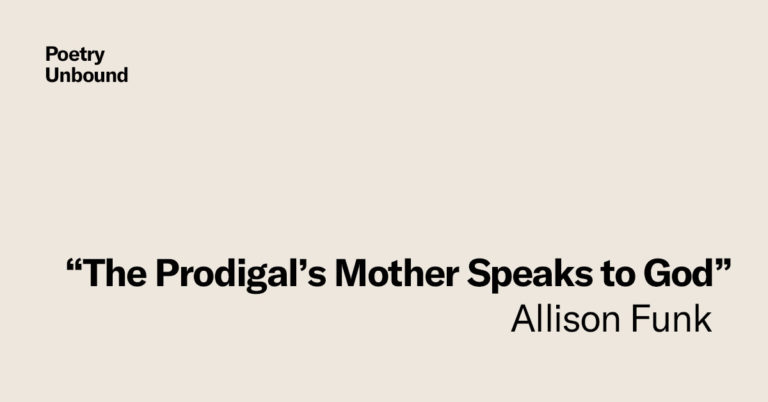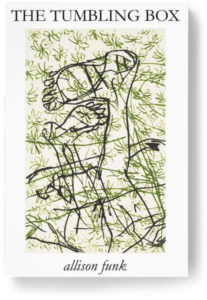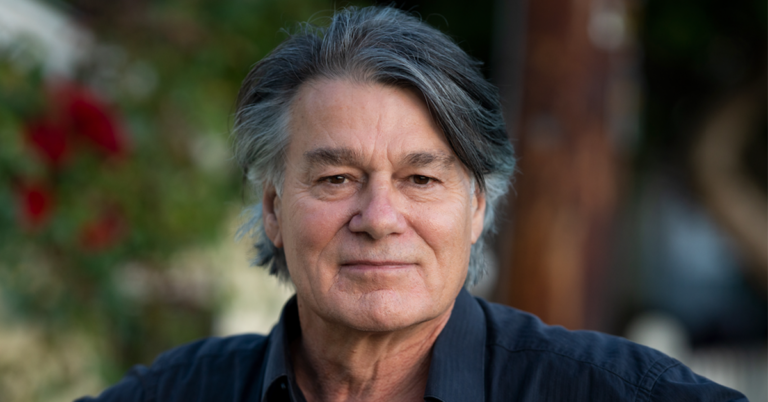Allison Funk
The Prodigal’s Mother Speaks to God
Allison Funk’s poem “The Prodigal’s Mother Speaks to God” tells the age-old story of The Prodigal Son through a new voice: the unnamed woman of the parable. This woman is truthful, wise, and loving. She knows the dedications and limitations of love. She seeks to see clearly, even though it’s hard to see clearly.
A question to reflect on after you listen: When has love been complicated for you?

© All Rights Reserved.
Guest

Allison Funk is a distinguished professor of English at Southern Illinois University Edwardsville. Her books include The Knot Garden, The Tumbling Box, and Wonder Rooms. Her forthcoming book is The Visible Woman. Her honors include a fellowship from the National Endowment for the Arts, the George Kent Prize from Poetry Magazine, and the Celia B. Wagner Award from the Poetry Society of America.
Transcript
Pádraig Ó Tuama, host: My name is Pádraig Ó Tuama. I’m a poet from Ireland. And I turn to poetry because I don’t always sleep well. And in the middle of the night, I like to get up and to do something kind and calm and calming to help me get through a night when I know I’m not going to sleep. And I find that accompaniment to be a great friend in the middle of the night.
[music: “Memoriam” by Gautam Srikishan]
Allison Funk, “The Prodigal’s Mother Speaks to God.”
“When he returned a second time,
the straps of his sandals broken,
his robe stained with wine,
it was not as easy to forgive.
By then his father
was long gone himself,
leaving me with my other son, the sullen one
whose anger is the instrument he tunes
from good morning on.
I know.
There’s no room for a man
in the womb.
But when I saw my youngest coming from far off,
so small he seemed, a kid
unsteady on its legs.
She-goat
what will you do? I thought,
remembering when he learned to walk.
Shape shifter! It’s like looking through water—
the heat bends, it blurs everything: brush, precipice.
A shambles between us.”
There’s an imagination project that Allison Funk is doing here. It builds on this idea that you find in the Gospel of Luke, of the story of the prodigal son, where there is a man who has two sons. The younger asks for his inheritance and goes off and squanders it, and then after he squanders it, he decides he’s gonna come back. And he imagines when he comes back, he’ll be treated like a servant, and instead, the father runs out and puts a cloak around him and a ring, and kills the fatted calf. The older son, however, who has never left, isn’t even told about this party, discovers it when he comes back in from working in the fields, asks a servant what’s going on, and the servant says, “Oh, your brother who’s gone is back.” And then the father has to go out to calm the older brother.
And what I love that Allison Funk does is, she goes into it by looking at what’s the corner of the story that isn’t told? And she suggests that to narrate it from the point of view of this mother, this absent mother who’s not mentioned at all. And then she causes some of the characters to be looked at in a new way.
So, first of all, this son who had left and is repentant and coming back. And then she says, “When he returned a second time the straps of his sandals broken his robe stained with wine” — and you wonder about an addictive cycle of something being set up or the reasons why a person has to leave. And then we hear about the father. And the poet says, “By then his father / was long gone himself” — what’s that mean? Was he dead? Had he just left? Had he disappeared? And suddenly, this family that’s presented in the Gospel of Luke in a way that’s often used for parables about return is made much more contemporary. And you also realize, “Oh, maybe that family was always fairly dysfunctional” and that this is never meant to be the story of a perfect family, but the story of complex family.
So that line, “It was not as easy to forgive,” shows the fact that forgiving is an ongoing process and that forgiveness doesn’t happen once and then is firmly established. Things can be reopened, wounds can bleed again. And I think that the courage of Allison Funk to locate that question in the love between a mother and son is a really courageous thing to do, because often, there’s — the civic narrative is that “Oh, there’s no greater bond between a mother and her children.” And this is saying, “Yeah, but it’s pretty difficult. It’s pretty tough. And it’s really complicated. And there might be the need for some modification.”
I have one friend who had had a life that was really out of control in terms of substance use. And she said that her dad, whenever she’d come home totally strung-out, totally wrecked, her dad would always get up and support her. And I have another friend who — his son was in a similar situation, and after six months, he said to his son, “This is the last time you’ll do that. You’re going to need to find somewhere else to live and some friends who’ll do this for you, because I’m not going to do this anymore.” And each of those describe those as loving responses.
That’s a really difficult, complex kind of love to speak about, but that’s the intelligence of love that floats through this poem. I think I’d really like somebody to read this poem and be able to pay hospitable attention to the times when they realized that love hurts and where you might have thought, “Oh, this’ll be straightforward,” or, “Forgiveness will solve everything,” or, “I will know what to do,” and the isolation of feeling, “I don’t know what to do here.” I think this poem offers the idea to say, “You’re in company. You feel alone, but you’re not. You’re in the company of a great throng of people, all trying to put words around prayer, around hope, around lament, and around love, to that experience.”
“The Prodigal’s Mother Speaks to God” by Allison Funk.
“When he returned a second time,
the straps of his sandals broken,
his robe stained with wine,
it was not as easy to forgive.
By then his father
was long gone himself,
leaving me with my other son, the sullen one
whose anger is the instrument he tunes
from good morning on.
I know.
There’s no room for a man
in the womb.
But when I saw my youngest coming from far off,
so small he seemed, a kid
unsteady on its legs.
She-goat
what will you do? I thought,
remembering when he learned to walk.
Shape shifter! It’s like looking through water—
the heat bends, it blurs everything: brush, precipice.
A shambles between us.”
Lily Percy: “The Prodigal’s Mother Speaks to God” comes from Alison Funk’s book The Knot Garden. Thank you to Sheep Meadow Press, who published the book, and gave us permission to use Alison’s poem. Read it on our website at onbeing.org.
Poetry Unbound is Tony Liu, Chris Heagle, Kristin Lin, Erin Colasacco, Serri Graslie, Eddie Gonzalez, and me, Lily Percy. Our music is composed and provided by Gautam Srikishan. This podcast is produced by On Being Studios, which is located on Dakota land. We also produce other podcasts you might enjoy, like On Being with Krista Tippett, Becoming Wise, and This Movie Changed Me. Find those wherever you like to listen, or visit us at onbeing.org to find out more.
Books & Music
Recommended Reading
The On Being Project is an affiliate partner of Bookshop.org and Amazon.com. Any earnings we receive through these affiliate partnerships go into directly supporting The On Being Project.










Reflections